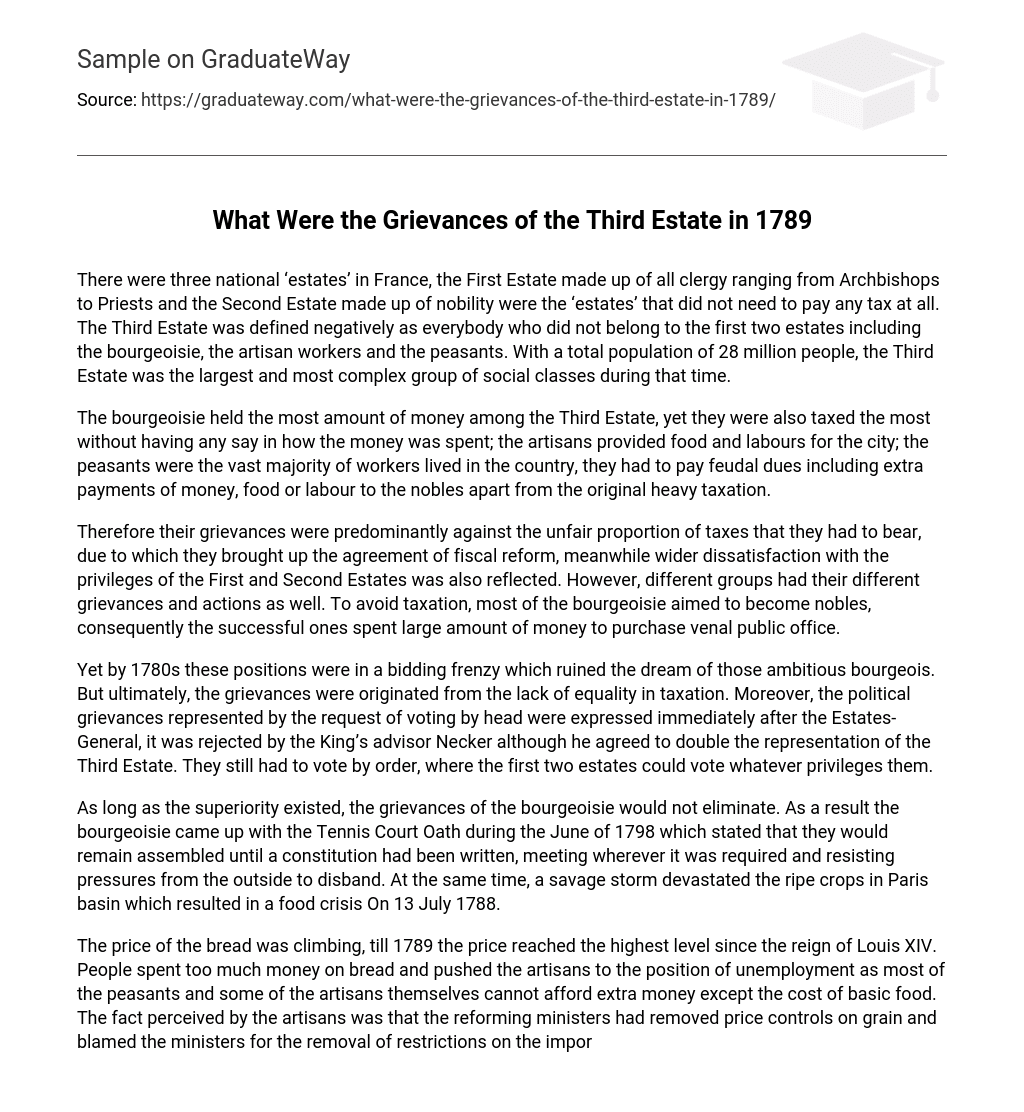There were three national ‘estates’ in France, the First Estate made up of all clergy ranging from Archbishops to Priests and the Second Estate made up of nobility were the ‘estates’ that did not need to pay any tax at all. The Third Estate was defined negatively as everybody who did not belong to the first two estates including the bourgeoisie, the artisan workers and the peasants. With a total population of 28 million people, the Third Estate was the largest and most complex group of social classes during that time.
The bourgeoisie held the most amount of money among the Third Estate, yet they were also taxed the most without having any say in how the money was spent; the artisans provided food and labours for the city; the peasants were the vast majority of workers lived in the country, they had to pay feudal dues including extra payments of money, food or labour to the nobles apart from the original heavy taxation.
Therefore their grievances were predominantly against the unfair proportion of taxes that they had to bear, due to which they brought up the agreement of fiscal reform, meanwhile wider dissatisfaction with the privileges of the First and Second Estates was also reflected. However, different groups had their different grievances and actions as well. To avoid taxation, most of the bourgeoisie aimed to become nobles, consequently the successful ones spent large amount of money to purchase venal public office.
Yet by 1780s these positions were in a bidding frenzy which ruined the dream of those ambitious bourgeois. But ultimately, the grievances were originated from the lack of equality in taxation. Moreover, the political grievances represented by the request of voting by head were expressed immediately after the Estates-General, it was rejected by the King’s advisor Necker although he agreed to double the representation of the Third Estate. They still had to vote by order, where the first two estates could vote whatever privileges them.
As long as the superiority existed, the grievances of the bourgeoisie would not eliminate. As a result the bourgeoisie came up with the Tennis Court Oath during the June of 1798 which stated that they would remain assembled until a constitution had been written, meeting wherever it was required and resisting pressures from the outside to disband. At the same time, a savage storm devastated the ripe crops in Paris basin which resulted in a food crisis On 13 July 1788.
The price of the bread was climbing, till 1789 the price reached the highest level since the reign of Louis XIV. People spent too much money on bread and pushed the artisans to the position of unemployment as most of the peasants and some of the artisans themselves cannot afford extra money except the cost of basic food. The fact perceived by the artisans was that the reforming ministers had removed price controls on grain and blamed the ministers for the removal of restrictions on the import of British manufactured goods which reduced the sales of French products.
The grievances led to the Storming of the Bastille, on 14th July 1789 which is stirred up by the news of events at Versailles. The artisans were concentrated at the towns and most of them were literate and militant therefore they could soon form their own powerful forces in the cities. They broke into the Bastille prison, in consequence de Launey, the governor of the Bastille, surrendered. The peasants were basically ignored by the Estates-General.
The bourgeoisie and the artisans might have a chance to voice their grievances, the peasants were totally excluded as most of them were illiterate and miscommunication always happened when they express their concerns to the local lawyer or lord, and more importantly they were too poor to be included by the meeting. The peasant families suffered even more form the food crisis as they had to pay more the feudal dues.
They started small regional protests of about bread price in late 1788 and continued to protest against hunting rights, feudal dues, tithes and royal taxes in early 1789. They rose up and destroyed records of feudal dues and properties of nobilities. Surprisingly, no grievances were against Louis XVI personally or against the Monarchy as an institution in 1789, the artisans even advocated the King’s advisor Necker and started to realize that the government was closely linked to them. It was all about inequality and the miserable life it brought to them.





